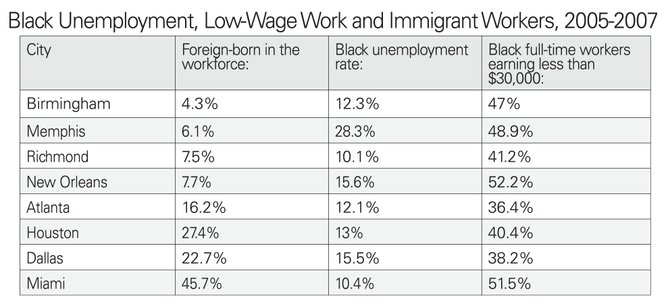When Chokwe Lumumba was a new member of the Jackson City Council, he went looking for an answer to the dubious adage that undocumented immigrants performing low-skill jobs in the U.S. take jobs away native-born African Americans. Lumumba, who sponsored an anti-racial-profiling ordinance, turned to Dr. Steven Pitts, a labor policy expert at the University of California Berkeley Center of for Labor Research and Education.
"To many casual onlookers, a glance at construction sites, day-laborer gathering places, or restaurant kitchens shapes the impression that immigrant workers have little difficulty of obtaining employment. At the same time, unemployment in black communities has risen dramatically since the onset of the Great Recession; particularly hit hard are youth and people who are formerly incarcerated," Pitts writes in "A Note on the Research Concerning Blacks, Immigrants and Employment." The observations leads to the common perception that immigrants take jobs from blacks. But the facts fail to support that perception, Pitts finds.
To start, Pitts looks at black unemployment rates in a dozen southern cities with foreign-born workforces ranging from 4.3 percent (Birmingham, Ala.) to 45.7 percent (Miami). If it were true that foreign-born workers displaced African Americans, the black jobless rate should be higher in cities with large numbers of immigrants in the workforce. However, Pitts' analysis finds no such trend. Memphis, which has a foreign-born workforce of about 6 percent, had a black unemployment at the height of the Great Recession of 28.3 percent. Meanwhile, Miami had the highest percentage of foreign-born workers, 45.7 percent, and a black unemployment rate of 10.4 percent.
Using the same cities, Pitts compared the proportion of foreign-born workers to the percentages of blacks working full-time jobs that earn less than $30,000 per year. Regardless of the number of immigrant workers, the levels of black full-time workers making less than $30,000 varied only slightly.
In the city with the highest percentage of foreign-born workers, Miami, 51.5 percent of black workers earned less than $30,000. That figure is nearly identical in New Orleans, where only 7.7 percent of the workforce is foreign born.
Increases in Latino presence in the workforce and certain occupations frequently held by blacks caused blacks to increase their level of education, which resulted in higher wages, Pitts wrote.
Read More:
Putting a Toe in the Water of the Race Conversation
What Is Racism? Why Meanings Matter in Conversations About Race
Racism Affects Families from Generation to Generation
Crimes Against (Some) Americans



Comments
Use the comment form below to begin a discussion about this content.
comments powered by Disqus